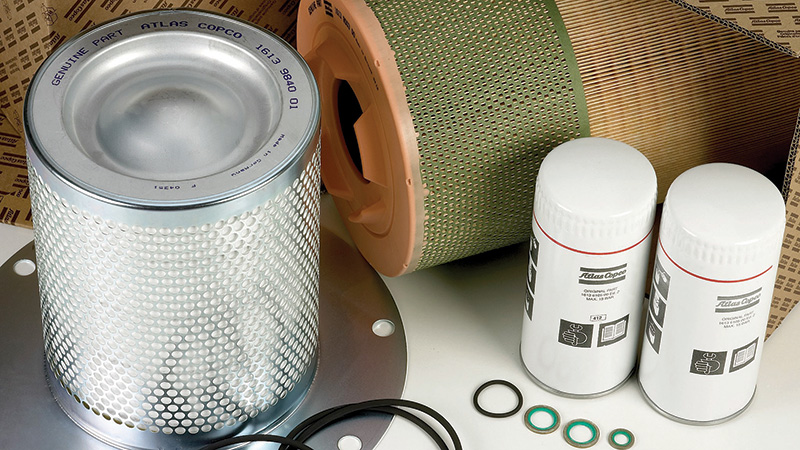NEWS: The importance of scheduled maintenance for air compressor systems
Optimise performance and energy usage, prevent failure and downtime, preserve longevity and protect your investment.
Regular maintenance is critical for air compressor systems. A typical system is composed of many parts that all require checking and monitoring to ensure the overall efficiency and operational health of the whole.
A compressed air network might include:
- Air compressor(s)
- Connecting pipework with joints and seals
- Receivers/storage tanks
- Filters
- Dryers
- Nitrogen Generators
- Output points
The lifespan and effectiveness of an air compressor unit and network can also depend upon other factors: the environment it is in and how harsh it is, the amount of dust and grime present and the end usage. Wear and tear can differ widely hence maintenance schedules are tailored to the demands and requirements of each system – and are subject to the manufacturer’s recommendations.
Maintenance frequency
Typically, compressor systems should be serviced once a year subject to manufacturing running hours (or as specifically instructed by the manufacturer), but it is advisable to check your system on a daily/weekly basis
Breathing Air
Air used for breathing has to be tested to EN12021, that requires testing is a minimum of 3 month intervals subject to specific customer risk assessment
WSE
A compressed air system greater than 250 bar/litres requires a Written Scheme of Examination(WSE) by law, which states the frequency of maintenance and inspection required for that system.
Routine maintenance generally includes:
- Changing of oil (in oil lubricated systems)
- Replacement of filters and oil/water separators
- Check compressor belt wear
- Check and clean filters, vents, belts and bearings
- Check condensation levels
- Check pressure levels (and loss)
- Apply lubricant to applicable parts
- Check pipework
(This list is purely an example and is not exhaustive).

Health checks and red flags
There are some particular signs which indicate a potential issue and should be acted upon:
- Changes in pressure
If you notice a change in pressure, a lack of, intermittent, or excessive pressure in the usual performance of your system it could mean that your air compressor requires attention. Failure to act on this may cause unnecessarily expensive remediation. Prevention is always better than cure. - Changes in sound
You will likely become attuned to the daily sound of your system. If you notice something usual such as banging, grinding or hissing for example, this is a good reason to perform an inspection. - Changes in energy usage
If your system suddenly begins to use more energy this could be a sign that your compressor is not running efficiently which could be as a result of a blockage, filter issue or air leak.
Being well acquainted with your system will allow you to recognise and be aware of these warning signs and remain ahead of the curve.

Planned Preventative Maintenance (PPM)
Many businesses prefer to take a proactive approach to what is often an expensive installation by investing in PPM. A scheduled maintenance plan takes the reactivity, risk and guesswork out of managing your system and provides peace of mind. Unexpected breakdowns can impact heavily upon productivity and delivery schedules, so having PPM in place is the optimum solution.
Monitoring software
Planned preventative maintenance often includes sophisticated monitoring software e.g. Atlas Copco’s SMART Link controller that continuously checks, evaluates and provides feedback on performance data. Remote monitoring also means that systems can be observed when off site, useful for multi-site scenarios or when maintenance managers are not in the building overnight and on weekends.
Air leakage
Most compressed air systems, even the newest and most up to date, are likely to experience some degree of leakage within six months of installation. Over time, leaks occur due to wear and tear, the effects of a busy and sometimes harsh industrial environment, corrosion or damage to valves and seals.
Although some leaks are audible (depending on the size and the amount of ambient noise in the environment), more often than not you won’t know that a leak exists unless you check, which is why regular leak detection surveys are important. A leak detection strategy is vital and easily undertaken in this day and age thanks to sensitive ultrasonic leak detection equipment that provides detailed illustrated reports that allow you to target and repair the leak completely.
Budget Management
Compressed air system maintenance can become expensive if left unmanaged. Putting a scheduled maintenance plan with quality spare parts in place has multiple benefits from pre-empting costly production outages, to ensuring ongoing efficiency. System inefficiency is directly connected to excessive energy usage so regular maintenance actually pays for itself.
Predictability and consistency
With PPM in place, plant and production budget management is controlled and predictable, so there should be no unpleasant surprises on the horizon be that in downtime or cost. Statistics show that fundamentally, a well-maintained system is proven to deliver the lowest cost of ownership, the highest ROI and the greatest peace of mind on average. The case for PPM is firmly established.

Filter and oil separator

Preventive maintenance kit
TO DISCUSS SCHEDULED MAINTENANCE FOR AIR COMPRESSOR SYSTEMS, CALL 01923 249444 OR EMAIL infoacl@aclengineering.co.uk
Optimise performance and energy usage, prevent failure and downtime.








